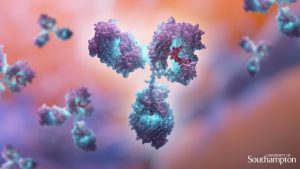Scientists at the University of SouthamptonŌĆÖs Centre for Cancer Immunology together with colleagues in the School for Biological Sciences have shed new light on a key aspect of the immune system.
It is known that many therapeutic antibodies targeting cancer work by recruiting the immune system. However, the body has a large number of other antibodies in circulation and within tissues that can act as competition for binding to the immune cell receptors that bind antibodies.

These endogenous antibodies act as noise and obscure the signal from the antibody bound to the target cancer cell.
In previously published research , Professor Max Crispin and colleagues have shown that by removing the competing antibodies, the cell killing activity of cancer-specific antibodies can be enhanced.
In a new study the current study, published in BBA General Subjects , the team including colleagues at the Centre for Cancer Immunology, reviewed how endogenous antibody acts to control how target-specific antibodies activate the immune system.
Professor Steve Beers said: ŌĆ£We are delighted to be able to highlight this important and under-appreciated aspect of the immune system and showcase how consideration of this signal-to-noise problem can inform the development of cancer therapies.ŌĆØ
The lead author of the review was recent graduate, Dr Hannah Bauer-Smith, who was funded by Against Breast Cancer and supported by a generous donation by Cisco Ltd.
The teamŌĆÖs cancer research is supported by Against Breast Cancer, the United States National Institute for Health, Cancer Research UK and the University of Southampton.
The full details of the published article are: Hannah┬ĀBauer-Smith,┬ĀAbigail S.L.┬ĀSudol,┬ĀStephen A.┬ĀBeers,┬ĀMax┬ĀCrispin. ęSerum immunoglobulin and the threshold of Fc receptor-mediated immune activationŌĆØ Biochimica et Biophysica Acta (BBA) ą General Subjects. Volume 1867, Issue 11,┬ĀNovember 2023, 130448. Link here: https://www.sciencedirect.com/science/article/pii/S0304416523001460?via%3Dihub